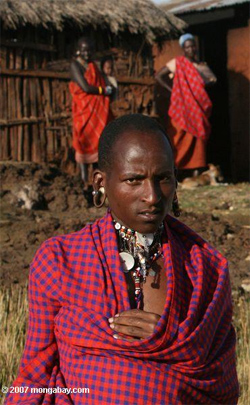Less than 2 percent of Africa’s tropical forests are under community control, hindering efforts to slow deforestation and alleviate rural poverty, reports a new assessment from the International Tropical Timber Organization (ITTO) and the Rights and Resources Initiative (RRI), a global coalition of non-governmental and community organizations.
Deforestation rates in tropical Africa are among the highest on the planet while the region’s people are among the world’s poorest. Forest communities are highly dependent on natural resources for subsistence but without title to the lands they traditionally use, they face loss of forests to developers, including loggers and agroindustrial interests. The report urges land reform to give forest dwellers better control over their land. At less than 2 percent, the proportion of land owned by or designated for use by the African forest communities and indigenous groups is but a fraction of the nearly one-third of all forests in Latin America, Asia, and the Pacific controlled by such groups.
 Loita man in Kenya |
“The slowness of reform is suppressing a whole range of opportunities to reduce poverty and improve livelihoods,” said Emmanuel Ze Meka, ITTO’s Executive Director. “Africa’s forest communities already generate millions of jobs and dollars in domestic and regional trade, and in indigenous livelihoods, but current laws keep some of these activities illegal and also undermine opportunities to improve forest management.”
The report says the legal recognition of community land will facilitate sustainable development activities under proposed systems to compensate tropical countries for reducing deforestation rates. The concept — known as REDD for Reducing Emissions from Deforestation and Degradation — is a climate change mitigation mechanism currently under discussion for the global climate framework to succeed the Kyoto Protocol. Deforestation and degradation accounts for at least one-third of emissions in most sub-Saharan African countries but without secure title to land, forest people could miss out on the potential benefits of a the carbon finance scheme.
The report, titled “Tropical Forest Tenure Assessment: Trends, Challenges and Opportunities,” cautiously notes indications of progress in some African countries, including Angola, Cameroon, Democratic Republic of the Congo, the Gambia, Mali, Mozambique, Niger, Sudan and Tanzania which have “introduced or amended laws to strengthen the land rights of local communities.”
“There are signs that some governments are starting to move to correct the imbalance and some good examples are emerging from across the region. It is now urgent to learn from the experience of other regions and quickly scale up the level of effort,” said Jeffrey Hatcher, lead author of the study.
“Recognizing local land rights alone doesn’t solve all the problems, but it’s a necessary first step, so these are certainly a positive developments,” said Andy White, the coordinator of RRI and advisor to the study. “Experience in other countries shows that governments need to follow up by supporting local management and enterprises. There are some countries that have recognized local land rights, but the government still controls the forest, and hands out concessions to industrial loggers – leading to more degradation and corruption.”
Tropical Forest Tenure Assessment: Trends, Challenges and Opportunities







